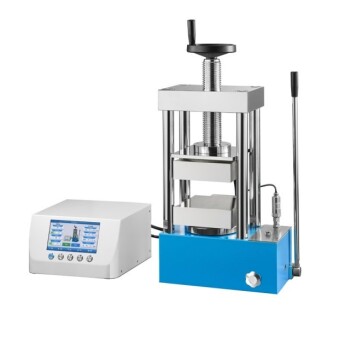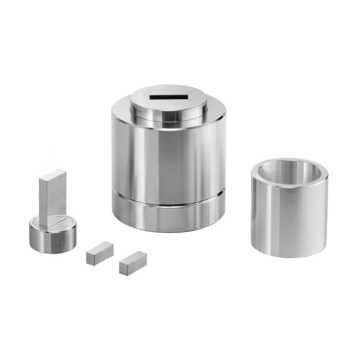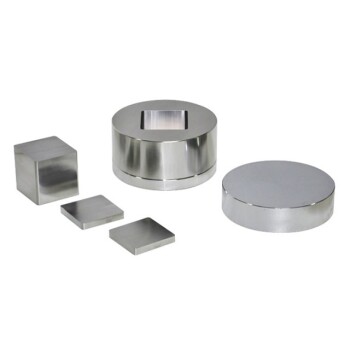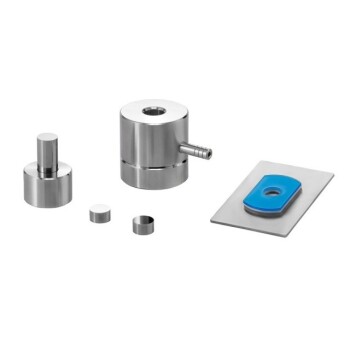Beyond the factory floor, the applications for hydraulic presses extend into surprising and highly specialized fields. While commonly associated with stamping car parts, their true utility is showcased in tasks ranging from traditional sword-making and food production to advanced scientific research, all enabled by their ability to deliver immense, precisely controlled force.
The versatility of a hydraulic press is not just in its raw power, but in its profound level of control. This combination allows it to be a critical tool for everything from crushing a car to preparing a delicate sample for microscopic analysis.

From Brute Force to Fine Detail: The Spectrum of Applications
The core function of a hydraulic press is to apply force, but how and why that force is applied varies dramatically across industries. This reveals its adaptability to nearly any task requiring compression, shaping, or separation.
Heavy Industrial & Recycling
The most familiar applications leverage the press's capacity for overwhelming force.
- Scrap Metal Compaction: Hydraulic presses are the machines used to crush cars and other large metal items into dense, manageable bales for recycling.
- Large Component Manufacturing: In the automotive and aerospace industries, they are essential for stamping out large body panels, forming strong structural beams, or shaping critical parts like turbine blades.
Precision Manufacturing & Craftsmanship
The same technology can be scaled down and refined for tasks that demand precision and control, not just power.
- Sword-Making: In a modern take on an ancient craft, blacksmiths use hydraulic presses to forge and shape steel blades, allowing for a level of control and force that is impossible to achieve by hand.
- Powder Compacting: Industries from ceramics to defense use presses to compact powdered materials into solid, dense forms. This is used to create everything from ceramic parts to specialized military components.
- Compression Molding: This technique uses a heated hydraulic press to shape plastics and rubber into specific, intricate forms by compressing the material into a mold.
Food & Consumable Production
Perhaps one of the most unexpected applications is in the food industry, where high pressure is used for extraction.
- Fat-Free Cocoa Powder: Hydraulic presses are used to squeeze cocoa beans under immense pressure, separating the fat (cocoa butter) from the solid components. The remaining solids are then milled into fat-free cocoa powder.
Scientific & Laboratory Use
In a laboratory setting, the press is a fundamental tool for sample preparation and materials testing, where precision is paramount.
- Spectroscopic Analysis: Scientists use small hydraulic presses to compress materials, like potassium bromide (KBr), into thin, transparent pellets. These pellets are then analyzed using methods like FTIR (Fourier Transform Infrared Spectroscopy).
- Materials Testing: Engineers and material scientists use hydraulic presses for tension and compression testing. This helps determine the strength, durability, and breaking point of materials like concrete or new metal alloys.
- Advanced Sample Creation: In research and development, pellet presses are used to create precise samples of catalysts or battery materials, ensuring uniformity for accurate experimentation.
Understanding the Key Principles
The ability of a single technology to span these diverse fields comes down to a few core engineering principles. Understanding them is key to seeing why the hydraulic press is so fundamental.
The Principle of Force Multiplication
At its heart, a hydraulic press operates on Pascal's Principle. In simple terms, a small amount of force applied to a small piston in a sealed hydraulic system generates a proportionally massive amount of force on a larger piston. This is how a small motor can generate hundreds of tons of force.
Unmatched Force Control
Unlike mechanical presses that deliver force in a rapid stroke, a hydraulic press can apply and maintain a specific pressure indefinitely. This ability to control the exact amount of force and hold it steady is critical for processes like compression molding or delicate lab sample preparation.
Adaptability of Form
The design of a press is highly modular. The size of the platens, the shape of the dies, and the tonnage rating can be customized for nearly any job. This allows for a small benchtop press in a lab and a multi-story behemoth in a forging plant to operate on the exact same principles.
Matching the Press to the Purpose
To select or understand a hydraulic press, you must first define your primary goal. The "best" application is entirely dependent on the problem you are trying to solve.
- If your primary focus is mass production and shaping: The key is a press designed for high-cycle stamping, forming, or molding of materials like metal and plastic.
- If your primary focus is material processing or extraction: You need a press optimized for sheer compressive force to compact scrap or squeeze liquids from solids.
- If your primary focus is precision and testing: The goal is a press that offers fine control over pressure for creating consistent lab samples or accurately measuring material strength.
Ultimately, the hydraulic press's enduring value lies in its simple but powerful ability to apply controlled force to solve nearly any physical challenge.
Summary Table:
| Application Area | Key Uses |
|---|---|
| Heavy Industrial & Recycling | Scrap metal compaction, large component manufacturing |
| Precision Manufacturing & Craftsmanship | Sword-making, powder compacting, compression molding |
| Food & Consumable Production | Fat-free cocoa powder extraction |
| Scientific & Laboratory Use | Spectroscopic analysis, materials testing, advanced sample creation |
Unlock the power of precision with KINTEK's hydraulic presses! Whether you're in a laboratory needing reliable sample preparation or an industry requiring robust force control, our lab press machines—including automatic lab presses, isostatic presses, and heated lab presses—deliver unmatched accuracy and durability. Enhance your efficiency and results; contact us today to find the perfect solution for your needs!
Visual Guide

Related Products
- Laboratory Hydraulic Press 2T Lab Pellet Press for KBR FTIR
- Manual Heated Hydraulic Lab Press with Integrated Hot Plates Hydraulic Press Machine
- Automatic Laboratory Hydraulic Press Lab Pellet Press Machine
- Laboratory Hydraulic Press Lab Pellet Press Button Battery Press
- Manual Laboratory Hydraulic Press Lab Pellet Press
People Also Ask
- How is a laboratory hydraulic press used for Tb(III)-Organic Framework FT-IR samples? Expert Pellet Pressing Guide
- Why must a laboratory hydraulic press be used for pelletizing samples for FTIR? Achieve Precision in Spectral Data
- What are some laboratory applications of hydraulic presses? Boost Precision in Sample Prep and Testing
- What role does a high-pressure laboratory hydraulic press play in KBr pellet preparation? Optimize FTIR Accuracy
- How do hydraulic press machines ensure precision and consistency in pressure application? Achieve Reliable Force Control for Your Lab



















